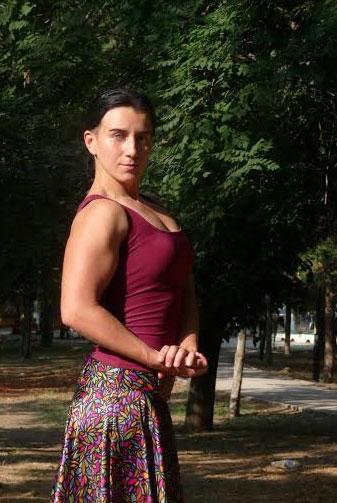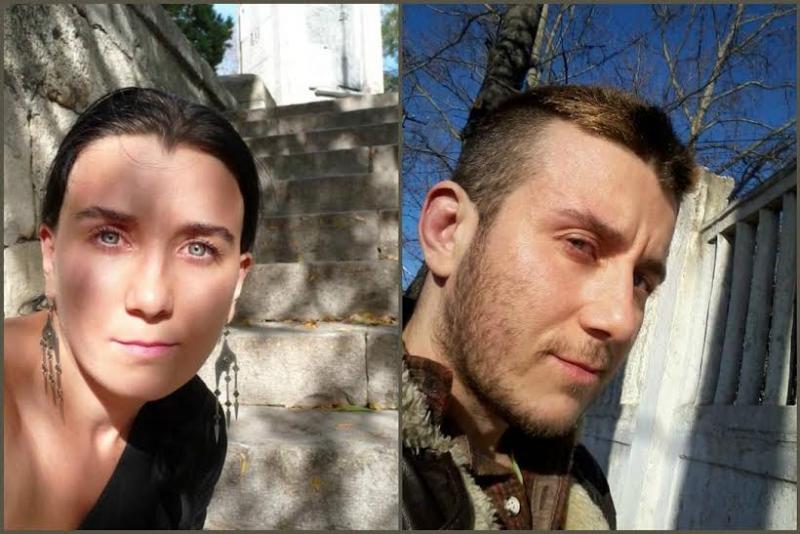Depuis l’annexion de la Crimée à la Russie en mars 2014, les droits et les communautés des personnes lesbiennes, gaies, bisexuelles, trans*, queers et intersexes (LGBT*QI) de la péninsule sont soumis à la loi discriminatoire et répressive de « propagande anti-gays » (lien en anglais).
Tangarr est né à Sébastopol, une ville située au bord de la Mer Noire. Mais cet homme trans* aux convictions et aux principes bien ancrés, soutenant le féminisme, les droits LGBT*QI et les droits humains en général, estime que la Crimée est aujourd’hui un lieu dangereux (lien en anglais) et a fui avec son partenaire en Ukraine continentale.
De l’identité
Contrairement à la plupart des personnes trans*, Tangarr a découvert un peu plus tard que son identité de genre n’était pas en accord avec le sexe qui lui avait été assigné à la naissance. Il nous a raconté que son enfance avait été relativement heureuse, que ses parents avaient une vision plutôt libérale du comportement que l’on attend d’un enfant. Son frère et lui ont été traités de la même façon, et on ne demandait pas à Tangarr « d’avoir le comportement d’une fille normale » ou de faire des choses que la société considère féminines.
« Je jouais aux cowboys et aux indiens, j’escaladais des montagnes avec mes parents et mon frère, on voyageait en sac à dos. Je faisais du judo. J’étais moi-même et je me sentais bien. »
Mais avec la puberté, il a vu surgir les difficultés. Il vivait mal les aspirations de sa mère, en particulier l’idée selon laquelle la puberté était la période qui « transforme les filles en de belles femmes », une idée qui est souvent enjolivée.
Cette métamorphose suscitait en lui des sentiments de frustration et du tourment. Il se souvient : « C’est dur de réaliser que le développement de votre corps prend une direction opposée à celle de votre psyché ».
La société ne l’a pas toujours traité comme il l’aurait souhaité, les gens voyaient en lui une jeune fille. Cela ne lui inspirait qu’une confusion et une impression d’incongruité, toutes deux liées au fait que leur perception le décevait.
« J’ai cru que j’étais lesbienne (parce que, vous savez, elles sont stéréotypées comme étant des femmes masculines), mais je préférais les hommes. C’est là qu’on se rend compte à quel point il est important d’éclairer les gens sur les questions d’orientation de genre et sexuelle. »
Tangarr décrit qu’il a cruellement manqué d’informations concernant les personnes trans*, ce qui l’a amené à croire que le plus gros problème venait de son corps. Il s’est mis à s’entraîner, « [est] devenu plus musclé et athlétique, mais quelque chose manquait clairement ». Bien qu’atténuée par un environnement assez libéral et par la compréhension et le soutien de ses ami-e-s, cette impression d’incongruité a continué de persister.
Sa vie a changé lorsque quelqu’un (qu’il connaissait) a cherché à l’insulter en lui disant : « Tu peux t’entraîner autant que tu veux, tu ne seras jamais un homme ». À cet instant, Tangarr a réalisé une chose à laquelle il dit n’avoir jamais pensé auparavant…
« Je me suis dit que j’étais seul. Une fille qui se sent comme un mec — un mec gay, qui plus est. »
Changements juridiques et obstacles
Avant de changer légalement de sexe, les renseignements que Tangarr a trouvés sur le net et les gens avec lesquels il a échangé l’ont aidé à s’orienter afin d’obtenir toutes les informations nécessaires au sujet de ce processus en Ukraine. Il a lu des témoignages, des articles médicaux, essentiellement tout ce qu’il pouvait sur les changements au niveau de l’apparence et sur le traitement hormonal de substitution.
Il a entamé sa thérapie et subi une mastectomie (ablation des seins) à Moscou, en Russie, puisqu’il « n’existe en Ukraine aucun chirurgien de qualité réputé dans ce domaine ». Pour lui, cela reflète aussi « l’ignorance générale de la population sur les questions trans*, et cela même parmi le corps médical ».
« Au nom de tout ce qui nous tient à cœur, il est impensable de refuser de relever ce défi. »
Mais l’Ukraine exige qu’une stérilisation irréversible soit pratiquée afin d’effectuer le changement de sexe. Tangarr s’est insurgé contre cette condition, car « la stérilisation forcée est discriminatoire pour mille et une raisons ». Avec l’aide d’un ami, il est parvenu à modifier ses documents légalement, sans avoir à subir d’hystérectomie (ablation de l’utérus). Il est l’une des très rares personnes à avoir procédé ainsi en Ukraine.
Discrimination/préjugés/violence et adhérer à des mouvements
« J’ai toujours trouvé bizarre que personne ne fasse rien pour empêcher que cela n’arrive… Et puis j’ai compris que ‘personne’, c’était moi ».
Les expériences que Tangarr a faites au cours de sa vie (de femme) l’ont amené à rejoindre le mouvement féministe, « dans la mesure où sa socialisation en tant qu’homme a mis en évidence tous les obstacles que les filles et les femmes ont à surmonter jour après jour ». C’est un activiste de Lavender Menace, un groupe dont les principaux domaines d’intérêt sont la théorie queer, le féminisme et les droits trans*. Il est aussi membre actif de la Trans* Coalition, qui rassemble les personnes trans* et leurs allié-e-s des pays de l’ex Union soviétique.
En décembre 2015, Tangarr a entamé son travail activiste et participé à un dialogue entre représentant-e-s de la communauté trans* des pays de l'Europe de l'Est et d'Asie centrale (EEAC, en anglais) et de l’Eurasian Coalition on Male Health ou ECOM (Coalition eurasienne sur la santé des hommes), afin de parler des stratégies de prévention et des traitements du VIH et du SIDA au sein de la communauté trans* en tant que groupe socialement vulnérable. Il a présenté un exposé sur « les préjugés cognitifs comme causes de la forte exposition des hommes trans* à l’infection du VIH, les méthodes de prévention et l’amélioration de la situation ».
Il a participé à la création d’un ouvrage d’information sur le genre, rédigé des articles sur le thème trans*, travaillé à une vidéo de soutien à Odessa Pride et s’est exprimé lors d’une émission télévisée au sujet des obstacles juridiques auxquels les personnes trans* sont confrontées lorsqu’elles tentent de changer de sexe.
Le Centre de la lutte contre le VIH et le SIDA de Kirovohrad (au centre de l'Ukraine) a invité Tangarr à donner une conférence sur les questions trans* à des journalistes, des activistes œuvrant en faveur des droits humains, des travailleur-euse-s de la santé et à la police.
Tangarr est fermement convaincu que « l’éducation est une panacée capable d’éliminer les préjugés et les idées erronées, la discrimination et la xénophobie ». Il a pour devise : « Optez pour la vérité le plus rapidement possible ».
« Plus nous savons de choses sur ce qui a trait à l’identité de genre et l’orientation sexuelle, moins nous nourrissons de préjugés. Les idées reçues engendrent de la souffrance. En abolissant l’ignorance, on diminue la détresse qu’elle provoque. »




